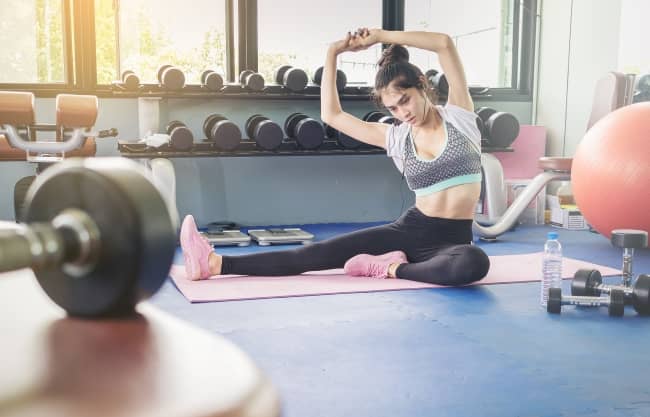Sore Today, Strong Tomorrow: Tips to Improve Muscle Recovery
Exercise is a crucial aspect of overall health and well-being. But proper recovery is just as important as exercise.
Too much physical activity without enough rest can lead to overtraining, putting you at risk of decreased immune function and stalled results.
In this article, we’ll cover the best tips to help your body recover after exercise.
The Best Tips to Improve Muscle Recovery
Exercise is technically a form of stress to the body. Physical activity can result in eustress, a positive state where the body produces growth. Alternatively, exercise can put the body into a negative state called distress.
The frequency and intensity of your exercise, combined with how much and how often you rest, dictates whether your body falls into eustress or distress.
With the right recovery regime, you can enhance your routine to help maximize your results.
Here are some of the best tips on how to improve muscle recovery after a workout.
1. Warm Up and Cool Down Properly
Mayo Clinic confirms that a proper warm-up and cool-down can help decrease the risk of injury, enhance physical performance, and reduce muscle soreness.
Dynamic stretches are often recommended as the best way to warm up muscles, prevent overstretching, and reduce the chance of injury during exercise.
After a workout, be sure to allow 5 to 10 minutes for a proper cool down that gives your body time to recover gradually. As opposed to dynamic stretching during a warm-up, the cool-down period is a great time to focus on static stretches.
2. Stay Hydrated
Drinking enough water is key for maintaining overall health, and for supporting muscle recovery and repair. You can use a water calculator to determine how much water you need to drink in a day. If you live in a hot climate, are especially active, or sweat often, you may need to increase your water intake.
The key during and after a workout is to consume more fluid than you lose through sweat. You may also want to pay attention to important electrolytes such as calcium, sodium, potassium, and magnesium.
3. Nourish Your Body
Nutrition is another key component of the rest and recovery process. Aim to eat a balanced diet full of high-quality protein, fresh fruits and vegetables, and whole grains. A healthy diet helps ensure that you are supporting muscle tissue repair and the growth of lean muscle.
Vitamins and nutrients that are especially important to the recovery process include:
- B Vitamins
- Vitamin C
- Vitamin D
- Vitamin E
- Omega 3 fatty acids
- Magnesium
- Selenium
- Zinc
4. Consider a Post-Workout Supplement
Can post-workout supplements help recovery? There is a lot of debate surrounding this topic, but a high-quality post-workout supplement can be an excellent complement to a healthy, balanced diet.
When researching a post-workout supplement, look for one with electrolytes, B vitamins, and vitamin C to restore the nutrients lost during your training session and promote recovery.
Isagenix created AMPED Hydrate to nourish and replenish the body before, during, and after workout sessions. This delicious post-workout supplement contains only 35 calories and is:
- Free of artificial colours, flavours, and sweeteners
- Packed with nutrients, electrolytes, and vitamins to restore proper water balance and promote recovery
- Dairy-free
- Gluten-free
- Soy free
- Vegan friendly
- Specially formulated with an effective glycogen complex blend
- Designed to restore the proper water balance
BCAAs (branched-chain amino acids) may also help reduce muscle soreness after a workout and promote a shorter recovery period.
BCAAs can also be found in post-workout supplements or naturally in foods such as:
- Dairy products
- Eggs
- Beans
- Tofu
- Animal protein
5. Have Active Recovery Days
Rest days do not necessarily mean doing nothing. Light activity on your rest days can help nourish the muscles with nutrients, reduce stiffness, decrease DOMS (delayed onset muscle soreness), promote blood circulation, and help the body process metabolic waste.
Some of the best active recovery ideas include:
- Walks
- Light stretching
- Yoga
- Light cycling
- Swimming
- Tai chi
6. Get Enough Sleep
What is the most important part of the recovery process after exercise? Most experts would agree it is sleep.
Sleep is your body’s automatic recovery system and is a crucial aspect of reducing muscle soreness and supporting the muscle repair process.
Aim to get at least 7 hours of quality sleep a night to ensure your body’s recovery process is supported.
Related Reading: The Important of Sleep for Weight Loss
7. Consider Compression Clothing
Compression clothing refers to specific clothing that applies consistent pressure on the body. Although further research is needed, compression clothing is believed to help reduce muscle soreness, speed up the removal of metabolic byproducts, increase muscle oxygenation, and accelerate the recovery process.
8. Massage or Foam Roll
While the research is mixed, fans of massage claim it helps enhance recovery, boost circulation, improve lymph flow, and reduce muscle soreness.
Foam rolling is another common post-workout recovery tool. Along with a routine that includes dynamic warm-up stretches and a proper cooldown, foam rolling may be a helpful tool for maximising your training efforts.
9. Eat a Post Workout Snack
A post-workout snack that contains a mix of high-quality protein and healthy carbs provides your body with the nutrients it needs to begin the repair process.
Aim to consume your post-workout meal or snack within 60 to 90 minutes after your workout.
Here are some excellent post-workout meal and snack ideas:
- Unsweetened yoghurt with fresh fruit
- Homemade trail mix with nuts, dark chocolate, and raisins
- An omelette with eggs, mushrooms, onions, asparagus, or your favourite mix of veggies
- Whole grain toast with avocado
- A high-quality protein shake
- A smoothie made with avocado, frozen berries, banana, leafy greens, and unsweetened yoghurt
10. Elevate Your Legs
Elevating your legs above heart level through positions such as up-the-wall yoga poses can help reduce swelling and promote blood flow. Try combining leg elevation with deep breathing to support the recovery process.
11. Take a Cold Bath
Intense workouts can cause soreness, inflammation, and swelling as a result of microtears. If you find yourself sore after a workout, a cold shower or bath can help support recovery and decrease inflammation.
12. Reduce Stress
If you are under chronic stress, your body will have less energy to devote to the muscle recovery process. Higher stress levels have been linked to lower recovery, increased fatigue, and increased soreness after intense resistance exercise.
To decrease stress levels, practice deep breathing and mindfulness, participate in regular yoga sessions, and make time for your favourite hobbies.
13. Listen to Your Body
When it comes to the recovery process, if you feel like your body needs more rest, be sure to listen.
If a certain area of the body feels especially tight, focus on foam rolling or stretching that area. Pay close attention to how your body is feeling and any imbalances, and adjust your training routine accordingly.
Final Thoughts
Regular exercise is one of the most important steps to staying healthy. By eating a balanced diet, getting enough sleep, drinking enough water, and scheduling rest days, you can maximise your training efforts and promote muscle growth.
Looking for more workout tips, diet tips, or wellness tips? Check out our blog or contact us for personalised advice as you work toward your health, weight loss, or wellness goals.














